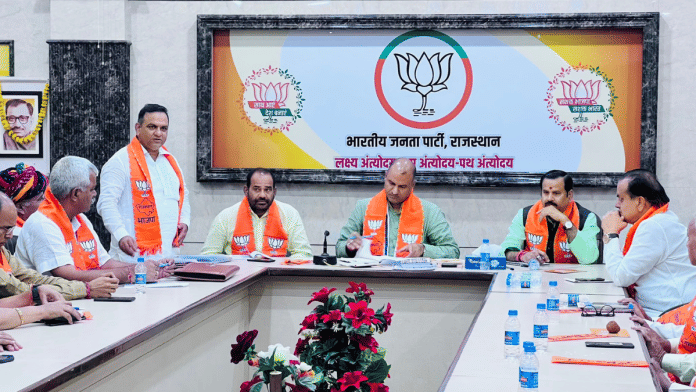New Delhi: The Bharatiya Janata Party (BJP)’s decision to give South Delhi MP Ramesh Bidhuri the charge of Rajasthan’s Tonk district is to “polarise” voters on Hindu-Muslim lines, not to woo Gurjars, Congress leaders and independent political analysts claim.
Bidhuri has been in the eye of a political storm after he used unparliamentary language against Bahujan Samaj Party MP Danish Ali in the special session of Parliament. In a letter to Lok Sabha Speaker Om Birla later, Ali accused Bidhuri of using “anti-Muslim remark”. Bidhuri’s remarks were later expunged by the Lok Sabha Speaker and Defence Minister Rajnath Singh had apologised for the comments made by the BJP MP.
The BJP’s decision to reward Bidhuri by giving him charge of Tonk district in the poll-bound state drew criticism from opposition parties. Bidhuri is a Gurjar leader and his appointment was then seen as an attempt by the BJP to woo Gurjars, who form a significant chunk of the population in Tonk and nearby districts. Congress leader Sachin Pilot, who represents Tonk in the assembly, is said to have a decisive sway over the Gurjar community.
Political analyst Rajiv Gupta says that Bidhuri’s new role has been assigned keeping in mind the Muslim population of Rajasthan. “Since Tonk is an area with a considerable Muslim population, the BJP has deputed Bidhuri to form a communal divide,” Gupta said. “Bidhuri is not known in Tonk. So, the argument that he’s been pitted against Pilot to get Gurjar votes doesn’t make sense.”
While the Muslim population of Tonk district is 10.77 percent, it is 47.18 percent in Tonk city. Tonk tehsil, on the other hand, has a Muslim population of 29.25 percent. The other two dominant communities in Tonk district — comprising four assembly constituencies of Niwai, Tonk, Deoli and Malpura — are the Gurjars and the Meenas.
Some areas of the district, like Malpura, have also had a history of communal flare-ups. For example, in 1992, 22 people were killed in the area after a mob went on carnage following the Babri Masjid demolition. The effect of that was also felt in July, 2000 when Kailash Mali, a BJP leader believed to have led the mob, was murdered. Twelve people were killed in the communal clashes thereafter. In April this year, there was stone-pelting between the Hindus and the Muslims in Malpura during Eid.
Speaking to ThePrint, Rajasthan Congress general secretary Jaswant Gurjar said that Bidhuri’s appointment points towards the BJP’s “doublespeak” and its tendency to indulge in “communal politics”.
“After Bidhuri spoke in Parliament, his party leaders apologised. They said he’d been showcaused. But on the other hand, he has been given a new position of responsibility. This shows that BJP wants to communally polarise Tonk.”
He, however, said that as a Gurjar leader, Bidhuri does not match up to Pilot.
“Rajesh Pilot was one of the biggest Gurjar faces in Rajasthan. Now his son Sachin Pilot is not just a big name in the community in Rajasthan, but also a big Gurjar face across the country. Bidhuri cannot turn Gurjar votes against Pilot,” he said.
There is a history of rivalry, often leading to violence, between the Gurjars and the Meenas. The Gurjars, classified as other backward classes (OBCs), held protests in the past demanding Scheduled Tribe (ST) status, a demand opposed by the Meenas who are STs. Together, the two communities dominate at least 30 assembly seats in the state.
Apart from Tonk, Gurjar-Meena caste politics also plays out in the neighbouring district of Sawai Madhopur. However, in the 2017 assembly election, both communities, which together form about 16 percent of the state population, rallied behind the Congress. This was in part due to efforts by Pilot who was then the state chief of the party. While Gurjars saw him as a community leader, the Meenas continued to support the party, in spite of their leader Kirodi Lal Meena switching sides to the BJP.
“This is a design by the BJP to polarise Hindu votes in Tonk. It was ruled by Nawabs and has a strong Muslim influence. The Malpura area, especially, is very communally sensitive,” political analyst Narayan Bareth said. “The area also borders Ajmer, another area where Muslims are dominant. So, the BJP thinks Bidhuri can help them there as well.”
“Until the 1980s, Tonk did not elect a Muslim. This is because the Muslims of the area, influenced by the Nawabi rule, did not believe much in electoral democracy. In 1985, Zakia Inam from the Congress was elected as MLA from Tonk. That is when the Muslims in Tonk started exercising their electoral power,” Om Saini, another political analyst, said. “It looks like they’ve brought Bidhuri in to create a scuffle. The Hindu sentiments will rise and the Muslims may not come out to vote. That will turn things in the BJP’s favour.”
ThePrint reached BJP state vice-president Mukesh Dadhich for comment via calls, but did not get a response. This report will be updated if and when a response received.
(Edited by Tony Rai)
Also Read: ‘Fiery leader, gets carried away’ — DU alum with ABVP roots, Ramesh Bidhuri has history of outbursts






